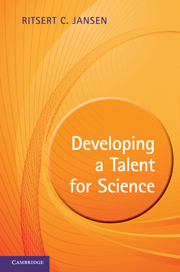2 - Use other people's talent
Published online by Cambridge University Press: 05 June 2012
Summary
“The hardest problems of pure and applied science can only be solved by the open collaboration of the world-wide scientific community.”
Kenneth G. Wilson, Nobel Prize winner, Physics, 1982Introduction
One plus one makes two, doesn't it? Wrong! One plus one can make a lot more than two and that is what synergy is all about. Combine your talent for science with that of other people.
As a Bachelor, Master's, or PhD student you will primarily be examined on the basis of what you have done (in an excellent way, e.g. your exam) or contributed (something novel and creative). Your results always build on top of what other talented people have contributed at an earlier stage. How can you make the most of other people's findings? As a postdoc or a professor you may be supervising students working on Bachelor, Master's, and PhD thesis projects, and you may also be collaborating with colleagues on a national or international scale. How can you make the most of your interactions with other people? The factors I see as being most essential are:
Read. Scientists write a lot. You may easily suffer from data overload. So what should you read, and how?
Listen. Scientists present their work at all kinds of meetings. Good listeners learn fast. You will experience ultimate moments of “eureka!” when a solution for your problem appears, or moments of “how curious” if a new view manifests itself. Can you learn to listen better?
[…]
- Type
- Chapter
- Information
- Developing a Talent for Science , pp. 48 - 85Publisher: Cambridge University PressPrint publication year: 2011



